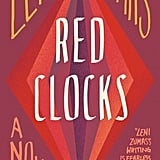

This fictional tapestry weaves together five female characters scrabbling with the expectations and constrictions of a country where reproductive rights are severely curtailed. Leni Zumas’ second novel, “Red Clocks ,” unfurls in a parallel America just a wrinkle in time away from our own. Prime example: The TV adaptation of “The Handmaid’s Tale,” which debuted just months after Donald Trump entered the White House, propelled Margaret Atwood’s feminist fable about a near-future American theocracy into the bestseller lists 32 years after its original publication. Some of the dystopias currently on offer seem not so much prescient as disturbingly present. Utopian fiction has largely fallen by the wayside these days, trampled by dystopian visions of futures devastated by technology, climate, consumerism, religion, totalitarianism, or all of the above. ( From the publisher.How many of us made it through the chaotic past year without occasionally wishing to wake up in an alternative universe? Novelists have the tools to rearrange our reality, testing the limits of things we take for granted - politics, technology, gender, nature - and twisting them into new shapes. This is a story of resilience, transformation, and hope in tumultuous-even frightening-times. In the vein of Margaret Atwood and Eileen Myles, Leni Zumas fearlessly explores the contours of female experience, evoking The Handmaid's Tale for a new millennium. Red Clocks is at once a riveting drama, whose mysteries unfold with magnetic energy, and a shattering novel of ideas. Gin is the gifted, forest-dwelling herbalist, or "mender," who brings all their fates together when she's arrested and put on trial in a frenzied modern-day witch hunt.


In a small Oregon fishing town, five very different women navigate these new barriers alongside age-old questions surrounding motherhood, identity, and freedom. In this ferociously imaginative novel, abortion is once again illegal in America, in-vitro fertilization is banned, and the Personhood Amendment grants rights of life, liberty, and property to every embryo.


 0 kommentar(er)
0 kommentar(er)
